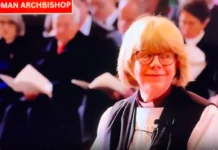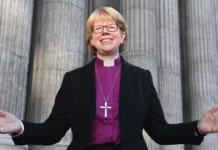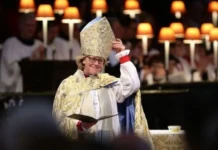For LGBT+ Christians, 2021 provided two significant causes for celebration. In June, the Methodist church became the largest religious denomination in the UK to allow same-sex marriage. Soon after, the Anglican Church in Wales voted to introduce special blessings for same-sex married couples. Across the border in England, the bishop of Liverpool, the Right Rev Paul Bayes, hailed the Welsh move, saying: “I trust that my own church will follow this creative and gospel-inspired lead, and I hope that this will happen soon.”
After more than a decade of bitter deadlock and hurtful division in the Church of England, there is a chance that this will be the year progress is made towards answering Bishop Bayes’ prayers. In April, a church-wide consultation on sexuality will come to an end, with its findings due to be published in the autumn under the title Listening to the Whole Church. The intention, according to the bishop of London, the Right Rev Sarah Mullally, is to find “a way forward for the church in relation to human identity, sexuality, relationships and marriage”. A commitment has been made to establishing a clear direction of travel at a General Synod in February 2023.
This moment of reckoning was intended to come earlier, but the pandemic intervened. Opting to follow in the footsteps of Wales and Scotland (where the Episcopal Church allowed same-sex marriage back in 2017) would begin a healing process, after what the archbishop of Canterbury, Justin Welby, has described as the “hurt and unnecessary suffering” caused to LGBT+ Christians by a protracted, tortured debate. Many believers have been made to feel like second-class members of the church. It is an absurdity that gay and lesbian English Anglicans should be obliged to travel to Cardiff or Edinburgh for a church blessing or wedding, and the requirement that gay Anglican clergy remain celibate in relationships has blighted lives and fostered an un-Christian culture of suspicion and surveillance. As senior clergy have argued, the church’s rigid stance on same-sex relationships is undermining its outreach efforts, particularly in relation to the young.
Theological conservatives have argued that any change to traditional teaching on sexuality should be approved by the worldwide Anglican Communion, which has 85 million members. Given the strong opposition of almost all African Anglican churches to wider LGBT+ rights, this would in effect ensure the preservation of the status quo in perpetuity. But within the Communion, each national church is independent. As Bishop Mullally has clarified, the way forward “is a Church of England decision”.
When the time comes to make that decision early next year, it will need to be taken in an atmosphere of mutual respect and compromise. The Church in Wales has agreed a “conscience clause” allowing individual clergy members to opt out of offering blessings to same-sex couples. But as the Church of England seeks to renew itself in the context of declining congregations, it should be bold in reading the signs of the times rather than rely on narrow readings of scripture. The gospels convey a message of loving inclusivity; England’s established church should reflect that.



